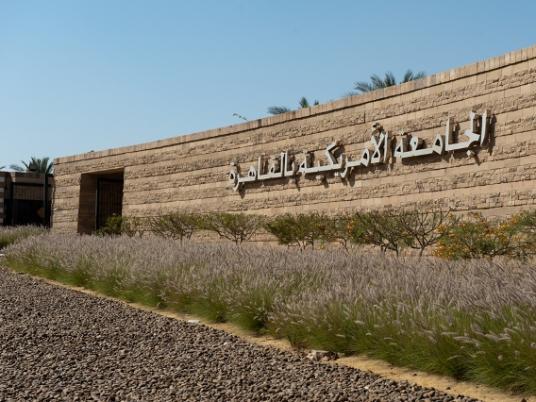The American University in Cairo staged its first full length Arabic play on its new campus at the Malak Gabr Arts Theatre on 19 November. “The Thief” by renowned playwright Tawfik El Hakim was colloquialized by Zeinab Mubarak and directed by professor of theatre Mahmoud El Lozy.
In a level-headed production by El Lozy, “The Thief” tells the story of Mahmoud Pasha Noaman, who covets his stepdaughter Khairiya. When she is accosted by admirer Hamed, the eponymous thief and bookstore clerk who climbs up her windowsill and crashes her bedroom, Mahmoud Pasha reacts violently, then quickly devises a plan to manipulate the circumstances to his advantage, establishing a setup that would make Khairiya more accessible to him.
The production struggles constantly to break from its flat tone, mostly the result of the stilted staging trapped in Stancil Campbell’s efficient yet restricting two-tiered set; too often we see actors facing each other in heated exchanges with nowhere to turn – the full expression of their characters attenuated by the confines of the space – and if they happen to be seated, the audience usually also ends up watching their energy dissipate over the course of the scene. However, occasional bursts of energy ensue when the action turns comedic, much in the same way that costume designer Nermine Said’s deftly applied splashes of red break her deliberate, and eventually haunting, monochromatic design. The compelling story becomes the primary agent in salvaging the production from the quicksand of dullness.
Seif Abd El Salam and Noha Gafar deliver commendably impassioned performances as the young couple Hamed and Khairiya, ironically and derisively referred to as “Romeo and Juliet” throughout the play, but they can’t help but veer towards self-righteousness in defense of their characters’ more ignoble choices, a move that soon turns from slightly heartbreaking to just pitiful. Undoubtedly a result of their added experience both onstage and off, Alaa Shalaby as Mahmoud Pasha and Samia Asaad as the mother deliver more balanced performances, unafraid to represent the less flattering sides of their characters; Shalaby never excuses Mahmoud Pasha’s unabashed and callous greed – which turns downright ugly at times – holding fast to a persuasive reasoning delivered with relentless conviction. And Asaad invests the mother’s frail compromises as well as her defiant last stand with suitable emotional gravity, placing both sides of this character on an equal footing.
El Hakim’s plays, even the social dramas such as this one, have often been accused of belonging solely to the théâtre des idées, working better as reading material than staged productions. And while it may be easy to reignite that argument in this instance, it can’t be said with any finality that a meditation on this play’s rich content wouldn’t warrant a stimulating evening out. In a narrative driven by self-interested characters torn between compromise and a constant effort to redefine their integrity, the accessible themes of corruption and corruptibility – manifest equally in the characters’ shady business practices and the shameless opportunism they exercise in their personal lives – are, at the very least, uncomfortably relatable.
El Lozy address the concern of transposing the play into the realm of performance by accentuating its humor where possible; in one concocted interlude, designed to accommodate a lengthy set change between the third and fourth acts, he stages offstage action in front of the curtain, imagining the comedic aftermath antics of a delegation that’s just paid a shamelessly obsequious visit to Mahmoud Pasha, and the result is a refreshing reprieve in a story designed to increasingly weigh down on its viewer. He’s also made confident, and hefty, cuts in the text; the characters’ moralizing and sermonizing, once a substantial portion of the play, are neatly done away with, and an even bolder move reshapes the final act.
El Lozy strips the play of its ending, including its denouement and resolution, firing the unavoidable question at the heart of the protagonist’s dilemma directly at the audience: What would you do in his predicament? And in the true spirit of one of theatre’s timeless functions, there’s no escaping the self-examination that comes with that confrontation, at least until you return to the comfort of the remote control and the luxury of choosing what you’re challenged by.
“The Thief” by Tawfik El Hakim, directed by Mahmoud El Lozy, runs from November 18 to November 24 at the Malak Gabr Arts Theatre, New Cairo Campus, AUC.
Tickets are available at the Theatre Box Office, AUC Center for the Arts, New Cairo Campus and the AUC Bookstore, Tahrir Square Campus.
For ticketing and reservations call 012-172-1526 or 2615-4191/4108
[email protected]




